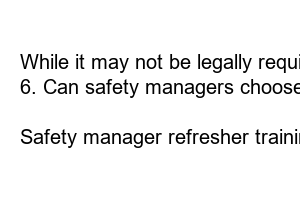안전관리자 보수교육
Title: Ensuring Workplace Safety: The Importance of Safety Manager Refresher Training
Intro:
Workplace safety is of utmost importance in every organization. To ensure a safe and secure work environment, companies rely on their safety managers. These professionals play a critical role in implementing and maintaining safety protocols. However, as regulations and standards evolve, safety managers need to stay updated with the latest practices. This is where safety manager refresher training comes into play.
1. The Need for Continuous Learning:
Safety protocols and regulations change over time, making it crucial for safety managers to update their skills and knowledge. Continuous learning through refresher training allows safety managers to stay up-to-date with the latest safety practices and ensure compliance.
2. Bridging the Knowledge Gap:
Refresher training for safety managers provides an opportunity to bridge any knowledge gaps that may have emerged since their initial training. Through engaging and educational courses, professionals can refresh their understanding of safety regulations, equipment, and risk assessment techniques.
3. Revisiting Essential Safety Topics:
Refresher training enables safety managers to revisit essential safety topics, reinforcing their understanding of core concepts. Effective courses cover a range of subjects, including emergency response, hazard identification, accident investigation, and ergonomics, ensuring a well-rounded knowledge base.
4. Enhancing Risk Assessment Skills:
Proper risk assessment is integral to a safe workplace. Safety managers who undergo refresher training gain valuable insight into identifying potential hazards, assessing risks, and implementing appropriate control measures. This helps safeguard employees from accidents and injuries.
5. Keeping Pace with Evolving Technologies:
With advancing technologies, workplaces undergo constant change. Safety managers’ refresher training equips them with the skills needed to adapt to these transformations. Courses now cover areas such as cybersecurity, artificial intelligence, and automation, ensuring that safety managers are well-prepared for emerging risks.
6. Building a Strong Safety Culture:
By investing in safety manager refresher training, organizations demonstrate their commitment to creating a strong safety culture. When safety managers are equipped with the latest knowledge and skills, they can effectively promote safety awareness and motivate employees to prioritize safe practices.
FAQs:
1. What is the frequency of safety manager refresher training?
Typically, safety manager refresher training should be undertaken annually to ensure the highest level of competency.
2. Are there any certification programs for safety managers’ refresher training?
Yes, many reputable organizations offer certifications for safety managers who complete refresher training, enhancing their professional credibility.
3. How long is a typical safety manager refresher training program?
The duration of these programs may vary, but most commonly fall within the range of 1 to 3 days.
4. Can safety managers attend refresher training remotely?
Yes, many organizations now offer virtual or online refresher training programs, allowing safety managers to participate from anywhere.
5. Is refresher training mandatory for safety managers?
While it may not be legally required in all jurisdictions, companies recognize the value of refresher training and often make it mandatory to ensure a high level of safety standards.
6. Can safety managers choose specific training topics in their refresher courses?
Yes, some training providers offer customized refresher programs that allow safety managers to select topics based on their specific needs and areas of interest.
Summary:
Safety manager refresher training is vital for maintaining a safe work environment. Through continuous learning, revisiting essential topics, and enhancing risk assessment skills, safety managers stay up-to-date with evolving safety practices. By investing in their professional development, organizations demonstrate their commitment to fostering a strong safety culture and protecting the well-being of their employees.

